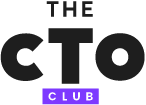12 Best Secrets Management Tools Shortlist
After a thorough evaluation, I've curated the 12 best secret management tools to address your specific challenges.
- Delinea Secret Server - Best for scalable enterprise solutions
- Thycotic Secret Server - Best for on-premise deployments
- Bitwarden - Best for open-source enthusiasts
- Delinea DevOps Secrets Vault - Best for DevOps integration
- Keeper Secrets Manager - Best for multi-platform support
- CyberArk Conjur - Best for audited compliance needs
- Doppler SecretOps Platform - Best for cloud-native environments
- Akeyless Vault Platform - Best for unified secret access
- CyberArk DEVSECOPS - Best for securing CI/CD pipelines
- HashiCorp Vault - Best for dynamic secrets management
- Azure Key Vault - Best for Microsoft Azure users
- Google Cloud Secret Manager - Best for Google Cloud integration
Navigating the intricacies of secrets management, I've delved into tools designed to safeguard your encryption keys, database credentials, API tokens, and more. Integrating a secrets management platform into your software development process will centralize access management across multi-cloud environments, ensuring endpoints in microservices and git repositories are protected. Embrace a trusted management service, and fortify your digital fortress.
What is a Secrets Management Tool?
Secrets management tools are specialized software SaaS-based platform solutions designed to securely store, manage, and provide controlled access to sensitive information, such as API keys, passwords, tokens, container orchestration platforms, and certificates. They play a pivotal role in ensuring that certain types of secrets remain confidential yet are accessible to authorized personnel or systems when needed.
These management systems bolster data security by turning plain text into fortified cryptography, defending against unauthorized access and potential data breaches. They streamline password management, store secrets like SSL/TLS certificates, and SSH keys, and maintain audit logs. Key rotation follows the principle of least privilege, safeguarding your source code and preventing mappings that expose secrets.
Overview of the 12 Best Secrets Management Tools
1. Delinea Secret Server - Best for scalable enterprise solutions
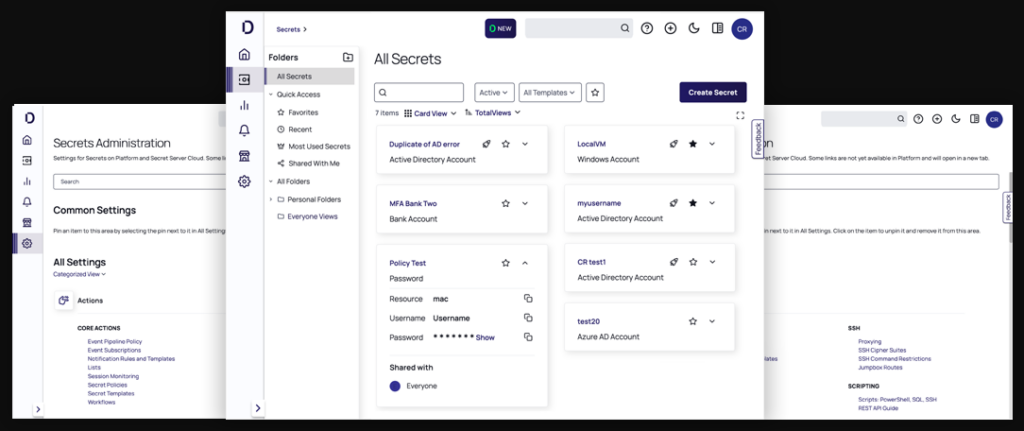
Delinea Secret Server is a dedicated software designed to manage sensitive data and credentials across various enterprise environments securely. Its architecture promises scalability and adaptability, addressing the intricacies of expanding organizations.
Why I Picked Delinea Secret Server:
Delinea Secret Server is the best scalable enterprise solution for secrets management. It stands out for its robustness and ability to grow with an organization, making it a top choice in a crowded market.
Standout features & integrations:
Delinea Secret Server is packed with features catering to enterprises’ evolving needs. Its role-based access control guarantees precise governance over who gets access to what, and its audit trails offer transparency into data access and usage. The tool integrates with leading IT platforms and applications, ensuring enterprises don’t have to reinvent their workflows. These integrations span SIEM solutions, ticketing systems, and other IT tools.
Pricing:
From $10/user/month (min 10 seats) + $100 base fee per month
Pros:
- Scalable architecture suitable for large enterprises
- Precise role-based access control
- Comprehensive audit trails for transparency
Cons:
- Might be too complex for smaller organizations
- Steeper learning curve for new users
- Pricier initial investment compared to some alternatives
2. Thycotic Secret Server - Best for on-premise deployments
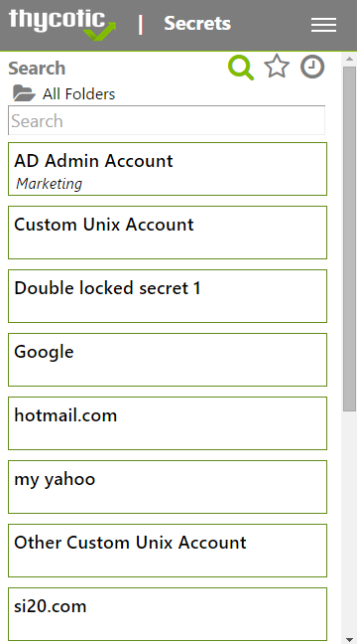
Thycotic Secret Server offers a comprehensive solution for organizations to manage, protect, and control access to sensitive data right from their infrastructure. Its emphasis on on-premise deployments ensures businesses maintain direct oversight over their secrets.
Why I Picked Thycotic Secret Server:
I recommend Thycotic Secret Server for organizations looking for on-premise secrets management tools. It's a great option for those who prioritize keeping their data within their walls and want added assurance.
Standout features & integrations:
Thycotic Secret Server boasts features like session recording, ensuring every activity is documented for future reference. Its disaster recovery capabilities mean businesses can recover quickly from unforeseen data mishaps. On the integrations front, Thycotic plays well with various tools, melding into IT ecosystems with integrations for popular SIEM solutions, ticketing systems, and identity management platforms.
Pricing:
From $15/user/month (min 20 seats) + $150 base fee per month
Pros:
- Tailored for on-premise deployment
- Session recording for improved transparency
- Robust disaster recovery capabilities
Cons:
- Might not cater to businesses seeking cloud solutions
- Requires internal IT maintenance
- Initial cost can be higher for smaller teams
3. Bitwarden - Best for open-source enthusiasts
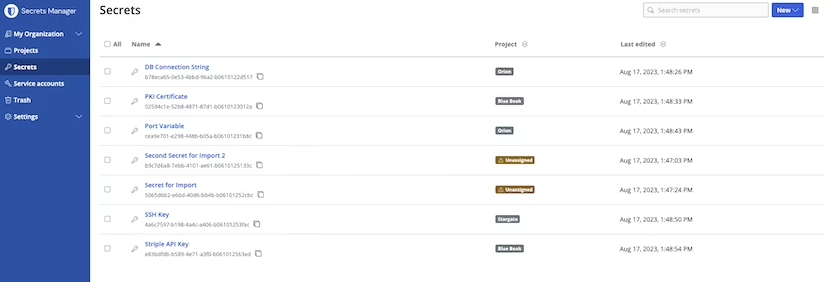
Bitwarden offers a secrets management tool designed with transparency at its core, as it operates on an open-source model. The platform's community-driven approach ensures continuous improvement and makes it a favored choice among those passionate about open-source.
Why I Picked Bitwarden:
When determining which tool to feature on this list, Bitwarden immediately stood out due to its open-source ethos. In the realm of secrets management, where trust is paramount, the transparency offered by Bitwarden is unparalleled. I chose this platform especially for those who hold open-source principles close to their heart, believing it's the best match for them.
Standout features & integrations:
Bitwarden has features like self-hosting capabilities, allowing organizations to retain complete control over their data. Its password generator and TOTP authenticator also enhance security by ensuring strong, unique secrets. As for integrations, Bitwarden works smoothly with various browsers and operating systems, providing easy access for users across diverse tech environments.
Pricing:
From $3/user/month (billed annually)
Pros:
- Truly open-source and transparent
- Self-hosting options available
- Strong security tools like password generators and TOTP
Cons:
- Steeper learning curve for non-technical users
- Annual billing may deter some potential customers
- Lacks some advanced features found in enterprise-focused tools
4. Delinea DevOps Secrets Vault - Best for DevOps integration
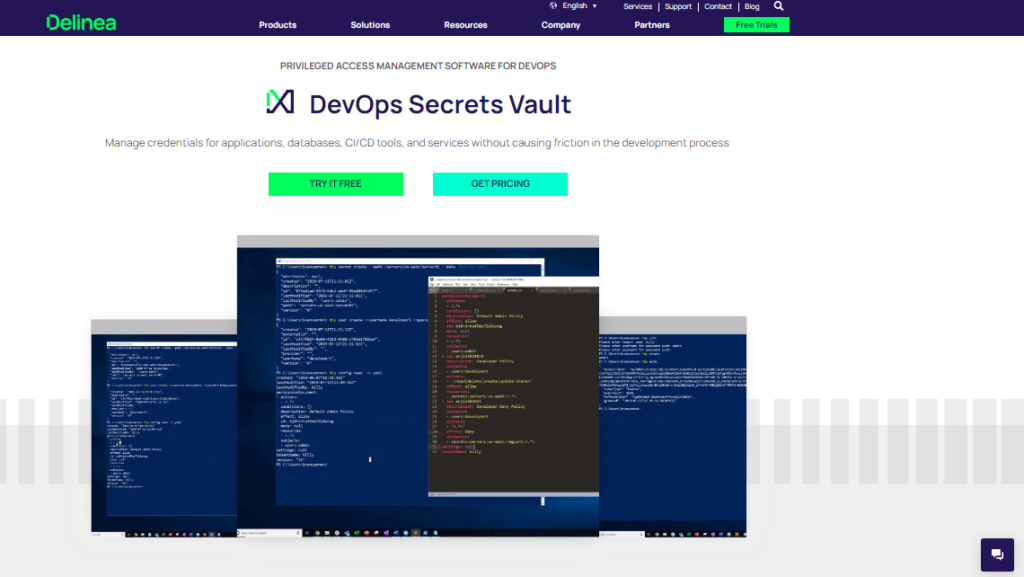
Delinea DevOps Secrets Vault offers an advanced secrets management solution for modern DevOps environments. With DevOps practices becoming more integral to efficient software delivery, this tool is crafted to integrate with these processes’
Why I Picked Delinea DevOps Secrets Vault:
In my quest to curate a list of top-notch secrets management tools, Delinea DevOps Secrets Vault stood out due to its tailored approach to DevOps ecosystems. It became clear that this tool could be a natural fit for teams deeply ingrained in DevOps, which is why I opined it's the best for DevOps integration.
Standout features & integrations:
Delinea DevOps Secrets Vault boasts features like high-speed secrets retrieval, ensuring minimal delay in DevOps pipelines. Additionally, it has robust role-based access controls, granting granular permissions and minimizing risks. In the realm of integrations, it shines by supporting a broad array of DevOps tools, including Jenkins, Kubernetes, and Terraform, facilitating smoother and more secure operations.
Pricing:
From $9/user/month (billed annually)
Pros:
- Tailored for DevOps environments
- High-speed secrets retrieval reduces pipeline delays
- Extensive integrations with popular DevOps tools
Cons:
- Might be overkill for teams not using DevOps
- Requires some initial setup and familiarization
- Premium features can push costs up for larger teams
5. Keeper Secrets Manager - Best for multi-platform support
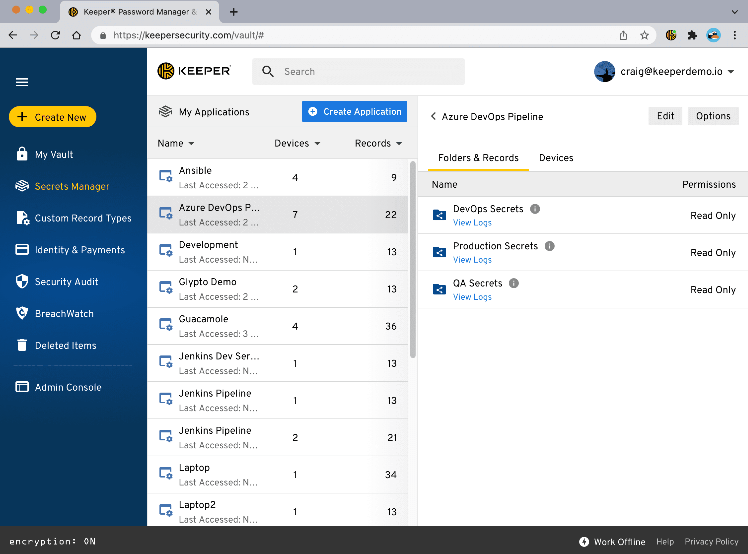
Keeper Secrets Manager is a comprehensive secrets management solution that handles sensitive data across diverse platforms. For businesses navigating the labyrinth of modern tech stacks, Keeper offers a haven, boasting compatibility with a wide array of media.
Why I Picked Keeper Secrets Manager:
I chose Keeper Secrets Manager for this list after determining that its multi-platform prowess was unmatched. While comparing various tools, Keeper's commitment to ensuring compatibility across multiple platforms became evident. I judge that for those who engage with an array of platforms, Keeper Secrets Manager is the optimal choice, hence it's best for multi-platform support.
Standout features & integrations:
Keeper Secrets Manager excels with its biometric login, providing an added layer of security. Its secure file storage also ensures that essential documents are kept away from prying eyes. On the integration front, Keeper integrates with popular platforms like Windows, macOS, and Linux but also offers extensions for most browsers and apps for mobile devices, ensuring a cohesive experience.
Pricing:
From $5/user/month (billed annually)
Pros:
- Comprehensive multi-platform support
- Biometric login adds an extra security layer
- Secure file storage ensures essential files remain confidential
Cons:
- Might come across as complex for simpler use-cases
- User interface may require a learning curve for some
- Additional features may come with extra costs
6. CyberArk Conjur - Best for audited compliance needs
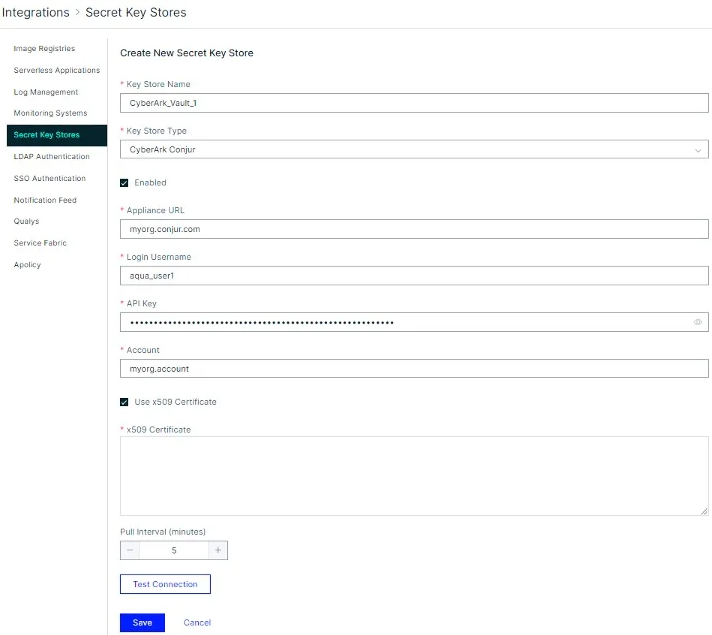
CyberArk Conjur is a specialized secrets management tool meticulously designed to secure sensitive information and credentials. With an emphasis on meeting stringent compliance requirements, it's built to provide enterprises with audit-ready solutions that protect and provide transparency.
Why I Picked CyberArk Conjur:
While selecting tools, I noticed a clear distinction with CyberArk Conjur regarding ensuring audited compliance. Judging from the myriad of solutions available, Conjur stood out, especially with its emphasis on providing auditable records of secret access. CyberArk Conjur fits the bill for those enterprises that must meet audited compliance needs.
Standout features & integrations:
CyberArk Conjur shines with its role-based access control, ensuring that secrets are only accessible to those with the correct permissions. Another noteworthy feature is its detailed logging system, which provides transparent and auditable trails of secret access. As for integrations, Conjur smoothly integrates with popular tools like Jenkins, Ansible, and Puppet, bridging the gap between secrets management and popular DevOps tools.
Pricing:
Pricing upon request
Pros:
- Role-based access control ensures tight security measures
- Detailed logging provides auditable trails
- Integrates with many DevOps tools
Cons:
- Might be overkill for smaller organizations without compliance needs
- The learning curve can be steep for newcomers
- Some advanced features might require additional costs
7. Doppler SecretOps Platform - Best for cloud-native environments
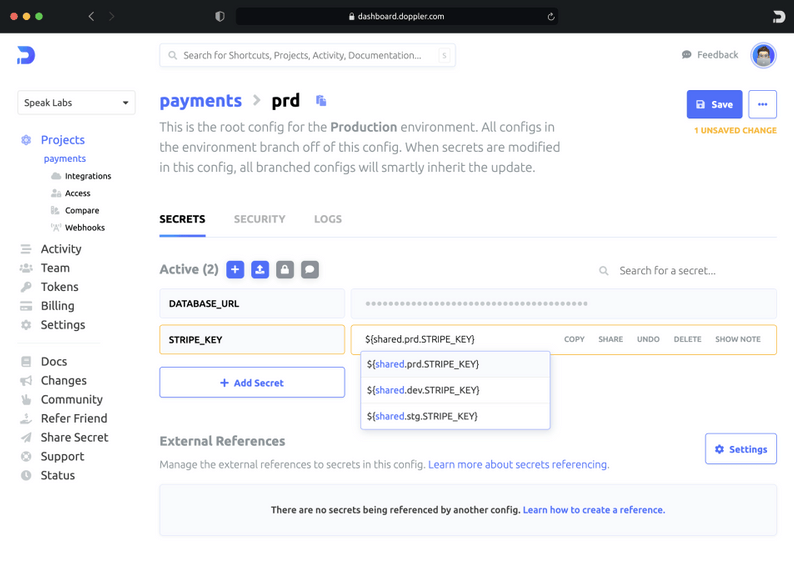
Doppler SecretOps Platform specializes in the centralized management and secure storage of application secrets. With a focus on cloud-native infrastructures, this platform streamlines secret operations for developers working in modern cloud environments.
Why I Picked Doppler SecretOps Platform:
Doppler's SecretOps Platform was a clear contender when determining which tools to include due to its strong alignment with cloud-native practices. I chose this tool because it offers robust support for organizations with deeply integrated cloud-native workflows.
Standout features & integrations:
Doppler SecretOps Platform boasts features like automatic secret rotation, reducing manual overhead, and increasing security. The platform also ensures that secrets are environment-specific, aiding in better organization and decreased cross-environment errors. For integrations, it connects with widely used cloud platforms like AWS (Amazon Web Services), Azure, and GCP, ensuring compatibility and smoother operations.
Pricing:
Pricing upon request.
Pros:
- Automatic secret rotation reduces manual effort
- Environment-specific secret storage promotes better organization
- Strong compatibility with major cloud platforms
Cons:
- Might not be as suited for non-cloud-native businesses
- Smaller organizations might find some features excessive
- Initial setup may require time for full integration
8. Akeyless Vault Platform - Best for unified secret access
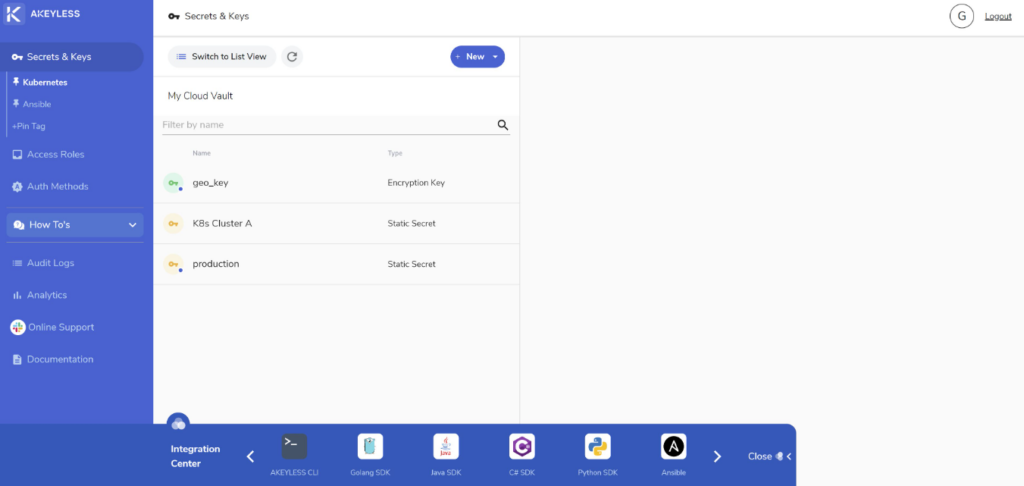
Akeyless Vault Platform is a solution that manages, stores, and controls access to digital secrets. Tailored to organizations aiming for streamlined access to various secrets, the platform provides a cohesive and unified approach, making it especially valuable for environments with diverse secret requirements.
Why I Picked Akeyless Vault Platform:
I chose Akeyless Vault Platform for its unified access to secrets. It manages secrets from any source, solving the scattered access issue in complex enterprises.
Standout features & integrations:
Key features of Akeyless Vault Platform include zero-trust access to secrets, ensuring a high level of security, and distributed architecture, which boosts resilience and scalability. Additionally, its platform-agnostic nature provides it can operate efficiently across various environments. It integrates effortlessly with popular DevOps tools like Jenkins, Kubernetes, and Terraform, augmenting the secret management process within these ecosystems.
Pricing:
Pricing upon request
Pros:
- Zero-trust access emphasizes security
- Distributed architecture ensures high availability
- Platform-agnostic design aids in diverse environments
Cons:
- Might have a steeper learning curve for beginners
- Some advanced features might be overkill for smaller setups
- Potential for extra costs with added integrations and features
9. CyberArk DEVSECOPS - Best for securing CI/CD pipelines
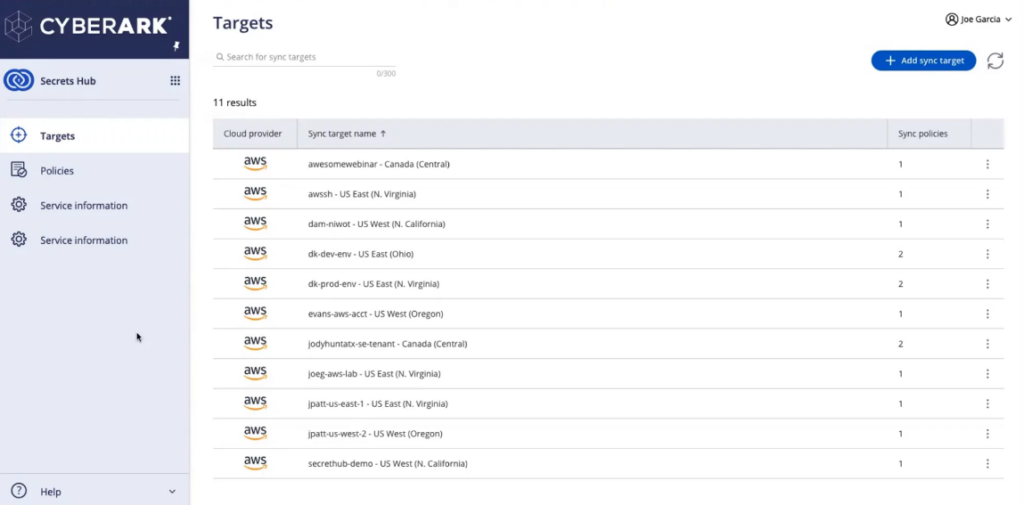
CyberArk DEVSECOPS tool enhances security in CI/CD pipelines with targeted vulnerability protection measures. Ideal for security-focused organizations.
Why I Picked CyberArk DEVSECOPS:
Among the many tools I surveyed, CyberArk DEVSECOPS stood out due to its dedication to securing the often overlooked CI/CD pipelines. Its in-depth understanding of the vulnerabilities inherent in these environments and its robust approach to addressing them made it distinct. I chose this solution because, in my judgment, it offers unparalleled protection where most needed - right within the CI/CD process.
Standout features & integrations:
CyberArk DEVSECOPS boasts features like just-in-time access, ensuring only authorized entities can make changes, and dynamic secret provisioning, which reduces the risk of secret leakage. Moreover, the tool's ability to scan for exposed secrets in the codebase adds another layer of defense. It integrates smoothly with popular CI/CD tools like Jenkins, GitLab, and Travis CI, facilitating a more secure development lifecycle.
Pricing:
Pricing upon request
Pros:
- Just-in-time access minimizes unauthorized interventions
- Dynamic secret provisioning prevents unwarranted exposures
- Codebase scanning identifies and rectifies exposed secrets
Cons:
- Might be complex for teams new to CI/CD security
- Integrations, while vast, might not cover every niche tool
- Requires continuous monitoring for optimal effectiveness
10. HashiCorp Vault - Best for dynamic secrets management
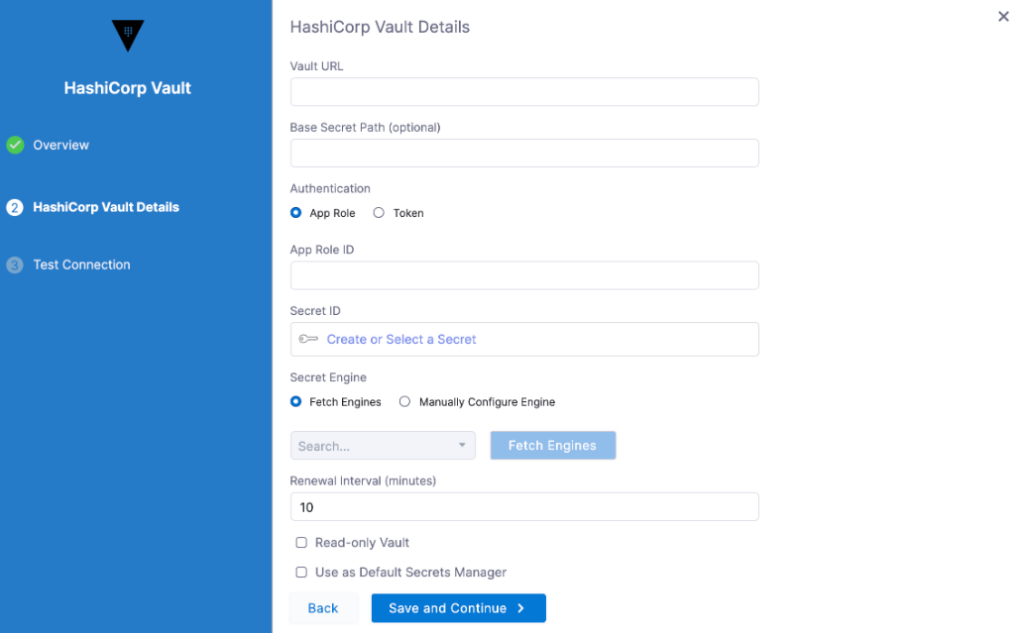
HashiCorp Vault offers organizations a centralized tool to manage, control, and protect sensitive data such as secrets, tokens, and certificates. As applications and infrastructure environments become more complex, the need for dynamic secrets management intensifies, making Vault's capabilities particularly essential.
Why I Picked HashiCorp Vault:
In the realm of secrets management, few tools can match the adaptability and comprehensiveness of HashiCorp Vault. I chose this tool after comparing various platforms and determining that its dynamic secrets management approach is unique. Based on my judgment, Vault is the go-to choice for organizations looking for robust, scalable, and flexible secrets management.
Standout features & integrations:
HashiCorp Vault distinguishes itself with features like on-the-fly generation of secrets, ensuring that applications access only what they need when needed, and automatic revocation of secrets post-usage. Furthermore, Vault's encryption as a service offers another dimension of data protection. The tool integrates efficiently with numerous platforms, including AWS, Kubernetes, and Terraform, allowing for secrets management software across various ecosystems.
Pricing:
Pricing upon request.
Pros:
- On-the-fly generation of secrets boosts security
- Versatile encryption as a service feature
- Wide range of integrations with key infrastructure platforms
Cons:
- Steeper learning curve for newcomers
- Setup and configuration can be complex
- Might be overkill for smaller setups or projects
11. Azure Key Vault - Best for Microsoft Azure users
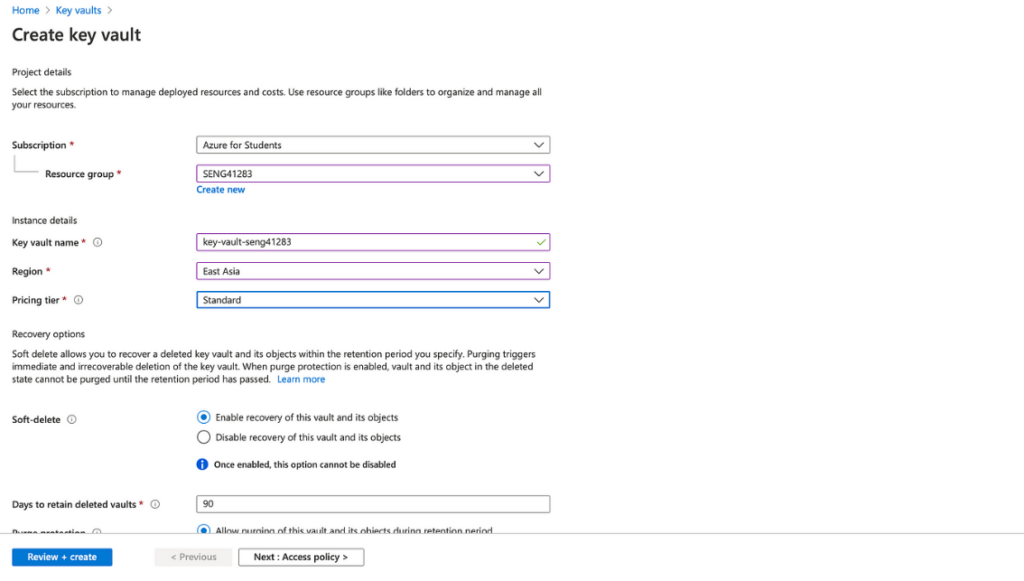
Azure Key Vault is a dedicated service within the Microsoft Azure cloud platform that manages cryptographic keys, secrets, and certificates for Azure-based applications. For businesses already leveraging the Azure ecosystem, integrating and managing secrets through Key Vault offers both simplicity and a native experience.
Why I Picked Azure Key Vault:
Through selecting and comparing, Azure Key Vault caught my attention due to its native integration with the Azure environment. For businesses that are deeply embedded in the Azure ecosystem, the choice of Azure Key Vault is almost intuitive. This native integration makes it an optimal choice, especially for Microsoft Azure users.
Standout features & integrations:
Azure Key Vault provides strong data protection with hardware security modules (HSMs). Its centralized management of application secrets ensures uniformity and consistency across services. Additionally, Key Vault integrates closely with other Azure services, making it easier for developers to keep application secrets without needing to handle them in their code.
Pricing:
Pricing upon request.
Pros:
- Native integration with the Azure ecosystem
- Utilizes hardware security modules for added protection
- Centralized management facilitates consistency
Cons:
- Might not be the first choice for non-Azure environments
- Initial setup might require familiarity with Azure
- Pricing can be complex due to various tiered options
12. Google Cloud Secret Manager - Best for Google Cloud integration
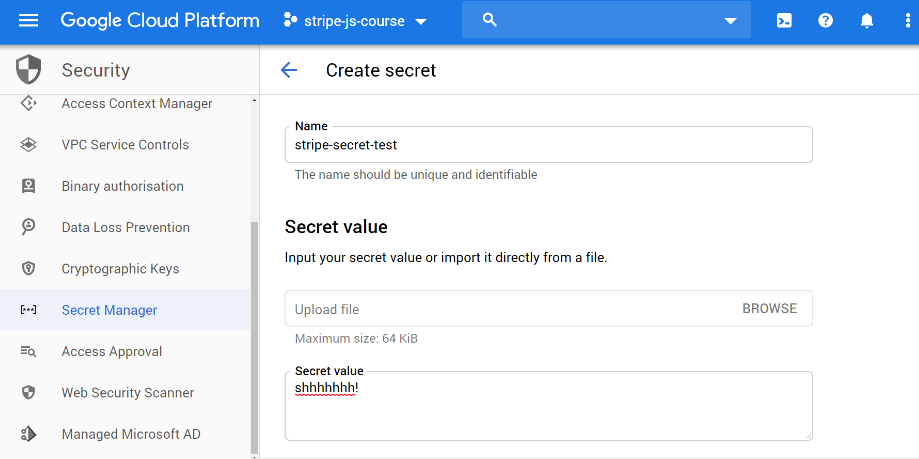
Google Cloud Secret Manager securely manages sensitive data for businesses using Google Cloud services.
Why I Picked Google Cloud Secret Manager:
When I was determining which tools to add to this list, the native integration of Google Cloud Secret Manager within the Google Cloud platform immediately stood out. Given my experience with secret management tools, the fluidity it offers for Google Cloud users became a defining factor in my choice. It’s best for businesses already committed to the Google Cloud suite as it offers a streamlined experience specific to that environment.
Standout features & integrations:
Google Cloud Secret Manager provides robust access controls using Cloud IAM policies. Its automatic and on-demand rotations of secrets help in maintaining the security lifecycle. Notably, the service easily integrates with popular Google Cloud services, ensuring developers have a familiar and cohesive experience.
Pricing:
Pricing upon request.
Pros:
- Tight integration with the Google Cloud platform
- Strong access controls via Cloud IAM
- Supports automatic rotations of secrets
Cons:
- Might not be suitable for non-Google Cloud platforms
- Has a learning curve for those new to Google Cloud services
- Pricing might vary based on usage and integrations
Other Noteworthy Secrets Management Tools
Below is a list of additional secrets management tools that I shortlisted but did not make it to the top 12. Definitely worth checking them out.
- Google Cloud Key Management - Good for integrated Google Cloud encryption
- 1password - Good for a comprehensive secret organization
- BeyondTrust Password Safe - Good for privileged account management
- Knox - Good for end-to-end encrypted secrets
- AWS Secrets Manager - Good for native AWS application integration
- BeyondTrust DevOps Secrets Safe - Good for DevOps secret automation
- BeyondTrust Cloud Vault - Good for remote access security
- LastPass Enterprise - Good for enterprise password centralization
- EnvKey - Good for configuration management
- Confidant - Good for distributed secret infrastructure
- CredStash - Good for AWS KMS-based secrets
- Keywhiz - Good for system-level secret storage
Selection Criteria for Choosing Secrets Management Tools
When diving into the expansive world of secrets management tools, it quickly becomes evident that the options are vast and varied. As someone who's evaluated dozens of secrets management tools, I was particularly interested in tools that deliver robust security and easy integration capabilities. With that lens, here are the criteria I held as paramount in making my selections:
Core Functionality
- Secure Storage: Tools should provide encrypted storage to protect sensitive information.
- Dynamic Secrets: Allow for secrets that are generated on-the-fly and given a limited lifetime.
- Rotation: Support automatic rotation of secrets to ensure consistent security.
- Access Control: Fine-grained permissions to determine who can access what secrets.
Key Features
- Audit Trails: Logs detailing who accessed what secret and when. Crucial for compliance and security review.
- Version History: Track changes made to secrets, enabling recovery of previous versions if needed.
- Integrations: Compatibility with significant platforms and apps to ensure efficient operations without workarounds.
- Multi-Factor Authentication (MFA): An added layer of security requiring users to provide two or more verification methods to access secrets.
Usability
- Intuitive Dashboard: Secrets management can get complex; the interface should be intuitive, ensuring users can locate and manage secrets without a steep learning curve.
- Role-Based Access: The tool should make assigning and modifying roles easy, ensuring that only authorized individuals have access to specific secrets.
- Responsive Customer Support: When dealing with something as crucial as secrets management, timely and knowledgeable support is non-negotiable.
- Documentation & Training: Comprehensive guides, wikis, or learning libraries should be available. The best tools also offer training sessions for new users.
Most Common Questions Regarding Secrets Management Tools (FAQs)
What are the primary benefits of using secrets management tools?
Secrets management tools offer several advantages:
- Improved Security: They encrypt sensitive data, ensuring unauthorized parties can't access it.
- Audit Trails: These tools maintain a record of who accessed which secret and when ensuring accountability.
- Automated Rotations: They can automatically change secrets at regular intervals, reducing the risk of exposure.
- Centralized Management: Organizations can manage all their secrets from one place, streamlining operations.
- Integration Capabilities: Many of these tools can easily integrate with various platforms, enhancing their utility and functionality.
How are secrets management tools typically priced?
The pricing for these tools can vary based on several factors, including the number of secrets stored, the number of users, and the features included. Some tools operate on a subscription model, charging monthly or annually, while others may charge per secret or per request.
What is the typical range of pricing for these tools?
Prices can range from as low as $5/user/month for basic offerings to over $100/user/month for enterprise-grade solutions with advanced features.
Which software is considered the cheapest and most expensive?
While specific pricing can change over time and based on promotions, as of this writing, tools like "EnvKey" and "CredStash" are more affordable. In contrast, enterprise solutions from major cloud providers like AWS Secrets Manager or BeyondTrust DevOps Secrets Safe can be on the higher end.
Are there any free options available?
Yes, some open-source tools like "Confidant" and "Keywhiz" are available for free. However, while they may not have a monetary cost, they often require more in-house expertise and management.
Other Secrets Management Tools-Related Reviews
Summary
Secrets management tools provide a necessary layer of protection and organization in today's digital age, especially when dealing with sensitive information like API keys, passwords, and tokens. With varied pricing models, including per-user and per-secret, there's a solution to fit every budget. From the open-source platforms suitable for those adept at self-management to the more intricate enterprise solutions, there's a spectrum of offerings catering to diverse needs.
Key Takeaways:
- Prioritize Security and Integration: The primary goal of a secrets management tool is to enhance security. Opt for a tool that secures your data and integrates well with your existing systems for a streamlined workflow.
- Understand Pricing Models: Different tools come with different pricing models, such as per-user or per-secret. Grasping these models’ nuances can help make an informed financial decision.
- Consider Scale and Future Growth: When selecting a tool, it's essential to factor in your current needs and future growth. The best tool will scale with your operations, ensuring continued efficiency and protection.
What do you think?
If you're using a secrets management tool that you believe deserves a mention or if there's one I missed that you'd highly recommend, I'd love to hear from you. Your insights and experiences can help others make informed decisions. Please drop me a suggestion or share your thoughts in the comments below. Let's keep the conversation going and the list growing.
